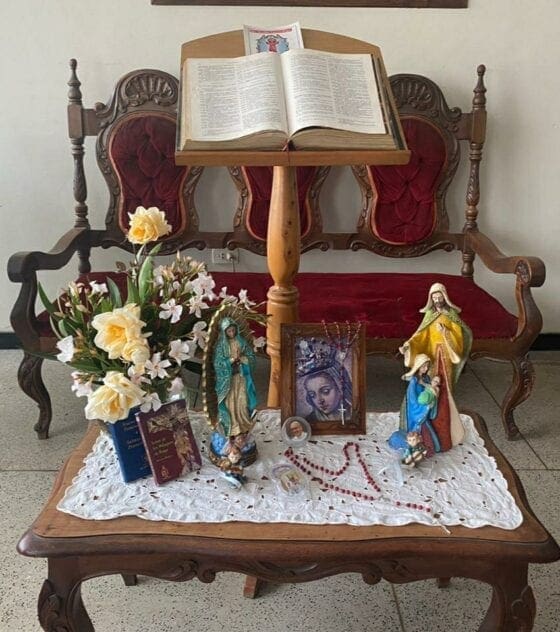 For the first time in our lifetimes, we live in times of forced “Eucharistic fasting”, due to the anti-coronavirus dispositions. The Eucharist certainly is the center of Christian life. It is a community experience and a celebration of our faith, and a source of comfort, consolation and strength. That is why it is indeed a painful and sad situation for many faithful. Most of the dioceses have made arrangements to broadcast the Eucharistic celebration in television and in internet. It can certainly be a good thing in this extraordinary situation. However, it is also an opportunity to focus on some of the not so emphasized aspect of our faith. It is a time for us to receive the incarnated Word in the Word itself that is the Scriptures. It is a time return to the Bible instead of waiting to listen to the Word of God only in the Eucharistic celebration.
For the first time in our lifetimes, we live in times of forced “Eucharistic fasting”, due to the anti-coronavirus dispositions. The Eucharist certainly is the center of Christian life. It is a community experience and a celebration of our faith, and a source of comfort, consolation and strength. That is why it is indeed a painful and sad situation for many faithful. Most of the dioceses have made arrangements to broadcast the Eucharistic celebration in television and in internet. It can certainly be a good thing in this extraordinary situation. However, it is also an opportunity to focus on some of the not so emphasized aspect of our faith. It is a time for us to receive the incarnated Word in the Word itself that is the Scriptures. It is a time return to the Bible instead of waiting to listen to the Word of God only in the Eucharistic celebration.
From time to time, the Church has always taught the faithful to encounter and receive the Jesus in the Word of God. The Second Vatican Council affirms that ”the Church has always venerated the divine Scriptures just as she venerates the body of the Lord, since, especially in the sacred liturgy, she unceasingly receives and offers to the faithful the bread of life from the table both of God’s word and of Christ’s body. She has always maintained them, and continues to do so….. “(Dei Verbum, n. 21). St. Jerome says, “We eat the flesh and blood of Christ in the Eucharist, but also in reading the Scriptures … I consider the Gospel the body of Christ.” Ignatius of Antioch writes: “We must approach Scripture as the flesh of Christ.,” and Maximus writes: “By means of every word written in the Bible the Word becomes flesh.” Caesarius of Arles writes: “Whoever listens in a careless way will be as guilty as he who negligently let the Body of the Lord fall to the ground.” This is why the Fathers speak of “Breaking the Word” just as the Eucharistic Bread is broken.
This forced time of “Eucharistic fasting” is an opportunity for everyone to rediscover that, according to the dictates  of Vatican II, the Bible must become everyone’s nourishment and be in everyone’s hands. Families could meet together on a daily basis, take the readings of the day, read them, be a little silent and conclude with a moment of intercession and prayer. For the religious, the Liturgy of the Hours could be given its role of celebrating the mystery of Christ in the rhythm of the day, to sanctify it. That is, to make visible the presence of God in daily life. In doing so this time physical distancing can be at the same time, a time of particular encounter with Jesus, present in the Scriptures as in the Eucharist, through prayerful listening to His Word.
of Vatican II, the Bible must become everyone’s nourishment and be in everyone’s hands. Families could meet together on a daily basis, take the readings of the day, read them, be a little silent and conclude with a moment of intercession and prayer. For the religious, the Liturgy of the Hours could be given its role of celebrating the mystery of Christ in the rhythm of the day, to sanctify it. That is, to make visible the presence of God in daily life. In doing so this time physical distancing can be at the same time, a time of particular encounter with Jesus, present in the Scriptures as in the Eucharist, through prayerful listening to His Word.
This Lenten season 2020 could then be a quarantine to remember God. It could a time to maintain intimate closeness with God, while we distance ourselves to the salvation of our neighbor and ourselves, but are still very close to each other through the awareness: God connects us and supports us! We understand this quarantine:
“that man lives not only on bread but on every word that comes from the mouth of God” (Dt 8,3).
Augustine Elayanikkattu Abraham Siby CM
Southern Indian Province.

